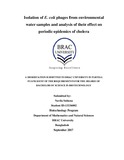Isolation of E. coli phages from environmental water samples and analysis of their effect on periodic epidemics of cholera

View/
Date
2017-09Publisher
BRAC UniversityAuthor
Sultana, NavilaMetadata
Show full item recordAbstract
Cholera is a deadly infectious disease caused by the pathogen Vibrio cholerae. In our
country cholera epidemics occur seasonally. Two peaks of outbreaks nicely coincide with
dry season and monsoon rain. Several factors control the outbreaks to occur and collapse.
Bacteriophages are one of them which have been reported to trigger the collapse of the
outbreaks. The concentration of the Vibrio cholerae specific bacteriophages is inversely
correlated with the concentration of Vibrio cholerae in the environment. Therefore these
bacteriophages probably play an important role in controlling the epidemics to occur or
collapse. It is still not clear what factors trigger the onset of cholera outbreaks. There are
numerous amounts of other species of bacteria and viruses in the environment that could
influence the cholera epidemic to start. This study was design to see the effect of E. coli
bacteriophages on the epidemics of cholera. Routine isolation and estimation of E. coli
phages reveal that pathogenic E. coli phage concentration is proportional to O1 Vibrio
cholerae (pathogenic) phage concentration. The concentration of nonpathogenic E. coli
phages does not oscillate like pathogenic E. coli phages. Therefore the oscillating
abundance pattern of pathogenic E. coli phages might control the concentration of
pathogenic E. coli which in turn controls the Vibrio cholerae count by some yet unknown
mechanism.
